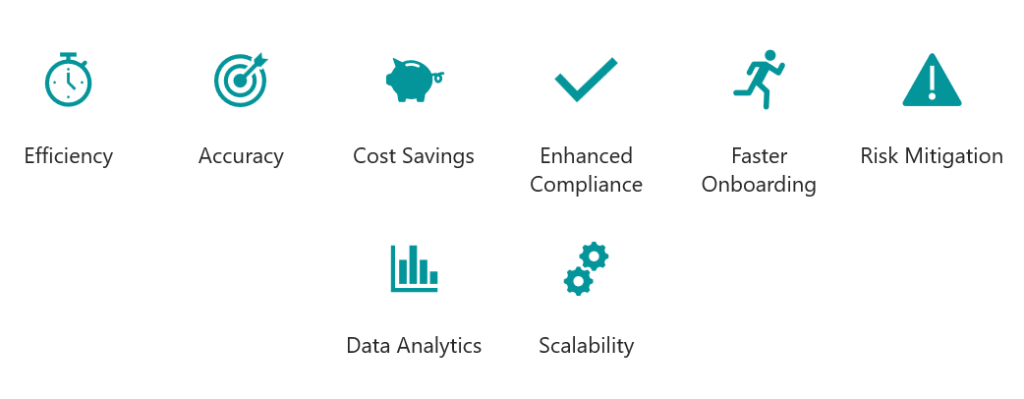Automating the identification and verification stage of Know Your Customer (KYC) leverages cutting-edge technology and data-driven methods to revolutionize customer onboarding while ensuring full regulatory compliance.
Below are ten essential components that can be used to automate the KYC identification and verification process.
- Document capture and recognition:
Utilize Optical Character Recognition (OCR) technology to extract data from identity documents such as utility bills, passports, and driver’s licenses. Automated systems minimize human data input errors by accurately reading and capturing essential information.
- Data extraction and validation:
Harness Natural Language Processing (NLP) techniques to extract and verify client data from gathered documents. The system can accurately identify and authenticate crucial details such as names, addresses, dates of birth, and other essential information.
- Biometric authentication:
Implement biometric verification methods, including fingerprint, facial, and voice recognition, for robust identity verification. Customers can submit biometric samples through a secure online portal, ensuring a seamless and highly secure verification process.
- Database and watchlist checks:
Integrate automated systems with databases and watchlists of sanctioned individuals or entities. Automated checks swiftly identify if a potential customer is listed on any regulatory watchlists, ensuring compliance with AML regulations.
- Identity matching and fraud detection:
Deploy machine learning algorithms to compare provided identification data with historical customer data, flagging inconsistencies or potential fraud. This proactive approach helps identify risks and detect suspicious activities.
- Electronic identity verification (eIDV):
Leverage eIDV solutions with advanced algorithms to authenticate identification documents by verifying holograms, watermarks, and other security features, ensuring the legitimacy of the provided documents.
- Database cross-referencing:
Automatically cross-reference customer-provided information with diverse databases, credit bureaus, and public records to verify accuracy and detect discrepancies. This process ensures the creation of a comprehensive, accurate and precise customer profile.
- Customer consent and authorization:
Implement automated consent management systems to guarantee that customers provide explicit consent for the collection and verification of their data. Streamlined automated workflows seamlessly guide customers through the requisite steps, ensuring accurate documentation of their consent.
- Risk scoring and profiling:
Harness automated risk-scoring models, leveraging collected data to assess the risk associated with each customer. This dynamic approach aids in determining the precise level of due diligence needed and strategically segments customers according to their risk profiles.
- Integration with regulatory guidelines:
Align KYC automation with stringent regulatory guidelines to ensure adherence to specific regulations. Continuous updates and vigilant monitoring guarantee that the process remains fully compliant with evolving regulatory standards.
Automating the identification and verification process of the KYC not only improves efficiency and accuracy but also enhances the customer experience by enabling a quicker and smoother onboarding process.
Automation of KYC – Opportunities

Automating KYC (Know Your Customer) processes in banking can offer several opportunities, including:
- Efficiency: Automation speeds up KYC verification, reducing manual efforts and processing time.
- Accuracy: Automated systems minimize human errors, ensuring accurate and consistent KYC compliance.
- Cost Savings: By reducing manual labor and streamlining processes, automation can lead to cost savings for financial institutions.
- Enhanced Compliance: Automation helps banks stay compliant with evolving regulations by ensuring consistent adherence to KYC standards.
- Faster Onboarding: Automated KYC processes enable quicker customer onboarding, improving overall customer experience.
- Risk Mitigation: Advanced automation can include real-time monitoring, aiding in identifying and mitigating potential risks promptly.
- Data Analytics: Automation facilitates better analysis of customer data, enabling banks to extract valuable insights for decision-making.
- Scalability: Automated KYC solutions are scalable, allowing banks to handle a growing volume of customers without a proportional increase in resources.
Investing in robust technology and data security measures is crucial to fully capitalize on the opportunities presented by KYC automation in the banking sector.
At Happiest Minds, we have an umbrella of solutions that exclusively cater to customer onboarding and compliance with the Office of Foreign Assets Control (OFAC) regulations, which involve implementing robust KYC (Know Your Customer) procedures.
This includes leveraging advanced technology such as AI-driven automation and biometric verification to streamline the onboarding process while ensuring thorough identification and verification of customers.
Additionally, integration with OFAC databases enables real-time screening to identify any individuals or entities on sanctions lists, thus mitigating risks of non-compliance and financial penalties. By combining efficient onboarding solutions with OFAC compliance measures, businesses can achieve both regulatory adherence and enhanced operational efficiency.
Our Netra Solutions helps to enable more natural and efficient customer interactions through chatbots and virtual assistants. It enhances sentiment analysis capabilities, allowing our customers to gauge customer feedback and market trends in real time. It also streamlines document processing tasks, accelerates risk management processes, aids in compliance monitoring and fraud detection, and enables personalized financial advice, ultimately fostering improved customer experiences and operational efficiencies.
Our key differentiators are a unique platform with a unique modular architecture that supports Multi-tenancy for Banking-as-a-Service, API-led connectivity for universal connectivity, a Digital document repository and a Comprehensive notification engine.
Most of our solutions are built-in Low-code platforms and enable rapid application development, allowing for faster go-to-market (GTM) strategies. Do get in touch with the BFS team to know more.

is the banking lead for Digital Business Services for BFSI at Happiest Minds. She has two decades of experience in the banking technology industry, with a focus on core banking solutions and large-scale digital transformation in banking and payments applications. At Happiest Minds, Padmini is primarily responsible for business outcomes and is a subject matter expert in banking.




